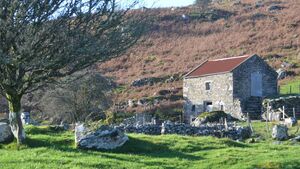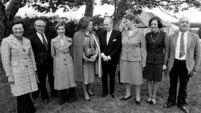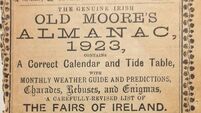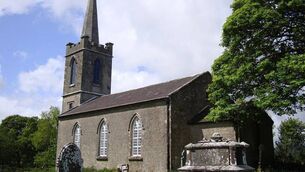Life and times of a Mayo revolutionary

Anthony Kerrigan grew up in the foothills of the Ox Mountains and spent many months on the run there during the War of Independence and Civil War. Picture: Pat McCarrick
The digitisation of the Military Service Pensions Collection is a valuable source for local historians with an interest in the 1916 to 1923 period at parish level and, indeed, regional level. The applications of the various participants, both male and female, provide us with both an overview of the era as well as a deeply detailed biography of the veterans of the War of Independence and the Civil War. Combined with the witness statements from the Bureau of Military History, which have been also been digitised, they are an excellent means of reconstructing a pen picture of the period euphemistically referred to as the Troubles.
Bonniconlon played its part in the fight for freedom. Boninconlon nestles in the shadows of the Ox Mountains and is not far from the Sligo border and the majestic salmon waters of the River Moy.
There was an ambush there during the War of independence in April 1921 and then during the tragedy of the Civil War there was another ambush at a place called Drumsheen on the road from Ballina to Tubbercurry at which the brave General Joe Ring from Westport was killed. One of the leading figures in the area of Bonniconlon was Anthony Kerrigan, of Kilgarvin, and this is his story. To give it context, Kilgarvin and Carracrom are townlands in the parish of Bonniconlon.
Anthony Kerrigan was born in Kilgarvin in September 1892 and died in Carracrom on January 24th, 1966. He was also a rate collector for Sallymount District Electoral Division in the late 1940s and early 1950s.
He was in the IRA and attained the rank of Captain, having held the ranks of Lieutenant and Adjutant in the company from 1918 to 1921.
Kerrigan had knowledge of drawing roadmaps, having been self–educated in this field, and he taught others in the company. During the War of Independence, he fought at the coastguard station at Enniscrone in August 1920 and took part in the firing at the Bonniconlon ambush in April 1921, as well as preparing for another ambush on the Ballina road in February 1921.
He was a district councillor for Sinn Féin and was first elected in June 1920 for the Kilgarvin District Electoral division and would sign his name in Irish because he was a keen advocate of the language. He was responsible for collecting the Republican loan fund for Bonniconlon parish in 1920, along with the chairman of Sinn Féin in the parish, Pat Kelly of Templeteigan. He also took part in post office raids in Corballa and Bonniconlon to raise funds for the Volunteers, as well as going to the homes of people in the parish who were intending to join the RIC and warning them not to assist the British in their campaign in Ireland.
Like many other IRA volunters of that era, he collected arms from the big houses in the parish like Beckett’s in Carra, Beatty in Carnaglough and Barbour in Bonniconlon. Frank Judge told of how he collected arms from these houses too as well as McGloin's in Attymass.
Kerrigan was part of the IRA company that knocked down three bridges on the Ballina to Bonniconlon road.
In his statement, Kerrigan remembered the capture and torture of Ned Durcan by the British in January 1921 when the conflict was at its most bitter.
Anthony Kerrigan often took up ambush positions along with his comrades along the Ballina Road when ordered to do so. His commanding officer at the time of the truce was Willie Loftus.
Kerrigan attended a training camp at Rathomisk House, near Kilbride, during the Truce and went to Limerick with other Mayo men from the 4th Western Division under the command of Johnny Barrett from Crossmolina. Michael Kilroy was his overall commander. Kilroy was the O/C of the 4th Western Division and he came from Newport.
Kerrigan took the anti-Treaty side in the Civil War. He and his comrades often ambushed Free State troops in the Kilgarvin area as the Free State Army had a camp in Bonniconlon at Barbour’s house. They kept him there for a week in the lead-up to the ceasefire but they got no information from him and they never knew his name. At the time of the ceasefire in late May 1923, he collected the arms in the area and dumped them in a lake in the Ox Mountains, having been carefully stashed away in a box that was made in Darcy’s workshop in Bofield.
Kerrigan was instrumental in the opening of the Republican plot in 1928 and at the first anniversary in Easter 1929 he recited the rosary in Irish with hundreds of others. He was arrested for Sinn Féin membership in 1931 by the Gardaí but was later released. Martin Glacken and Jim Kerrigan were also arrested. The Western People of December 1931 had the following piece relating to the arrest:
A year later, Kerrigan was on the same platform as Fianna Fáil’s PJ Ruttledge at a public meeting in Bonniconlon.
He was appointed a rate collector in September 1949 and collected rates for Sallymount and the general Bonniconlon area. He was also a founding member of the cumann of Fianna Fáil in Bonniconlon and was awarded an IRA pension in August 1937 of £28 6/8 per annum, which was paid to him until his death in January 1966.
Kerrigan was a member of the GAA and would have been on the committee that acquired its pitch in June 1936 and was a keen supporter all his life. He founded Munitir na Tire in 1949 and was also a member of Bonniconlon Show Committee. He was also on the committee of the Craobh Chonradh na Gailege with Seamus Maguire and also a member of the Bonniconlon Players in the 1940s and 1950s with Fr O’Grady.
Anthony Kerrigan died on January 24th, 1966, aged 73, at his sister’s home in Carracrom, Bonniconlon. He was buried in Bonniconlon with full military honours.





